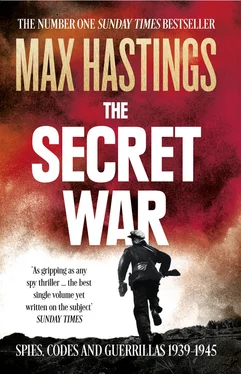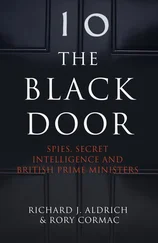William Collins
An imprint of HarperCollins Publishers
1 London Bridge Street
London SE1 9GF
WilliamCollinsBooks.com
This eBook first published in Great Britain by William Collins in 2015
Copyright © Max Hastings 2015
The author asserts the moral right to
be identified as the author of this work
A catalogue record for this book is
available from the British Library
Cover photographs © Topham/Picturepoint (figure, body); Sovfoto/Getty Images (figure, head)
Every effort has been made to trace copyright holders and to obtain their permission for the use of copyright material. The publisher apologises for any errors or omissions in the above list and would be grateful if notified of any corrections that should be incorporated in future editions of this book.
All rights reserved under International and Pan-American Copyright Conventions. By payment of the required fees, you have been granted the non-exclusive, non-transferable right to access and read the text of this e-book on screen. No part of this text may be reproduced, transmitted, down-loaded, decompiled, reverse engineered, or stored in or introduced into any information storage and retrieval system, in any form or by any means, whether electronic or mechanical, now known or hereinafter invented, without the express written permission of HarperCollins.
Source ISBN: 9780007503742
Ebook Edition © September 2015 ISBN: 9780008133023
Version: 2016-02-23
For
WILLIAM and AMELIE
the next generation
Cover
Title Page
Copyright
Dedication
Introduction
1 Before the Deluge
1 SEEKERS AFTER TRUTH
2 THE BRITISH: GENTLEMEN AND PLAYERS
3 THE RUSSIANS: TEMPLES OF ESPIONAGE
2 The Storm Breaks
1 THE ‘FICTION FLOOD’
2 SHADOWING CANARIS
3 Miracles Take a Little Longer: Bletchley
1 ‘TIPS’ AND ‘CILLIS’
2 FLIRTING WITH AMERICA
4 The Dogs that Barked
1 ‘LUCY’S’ PEOPLE
2 SORGE’S WARNINGS
3 THE ORCHESTRA PLAYS
4 THE DEAF MAN IN THE KREMLIN
5 Divine Winds
1 MRS FERGUSON’S TEA SET
2 THE JAPANESE
3 THE MAN WHO WON MIDWAY
6 Muddling and Groping: The Russians at War
1 CENTRE MOBILISES
2 THE END OF SORGE
3 THE SECOND SOURCE
4 GOUREVITCH TAKES A TRAIN
7 Britain’s Secret War Machine
1 THE SHARP END
2 THE BRAIN
3 AT SEA
8 ‘Mars’: The Bloodiest Deception
1 GEHLEN
2 AGENT ‘MAX’
9 The Orchestra’s Last Concert
10 Guerrilla
1 RESISTERS AND RAIDERS
2 SOE
11 Hoover’s G-Men, Donovan’s Wild Men
1 ADVENTURERS
2 IVORY TOWERS
3 ALLEN DULLES: TALKING TO GERMANS
12 Russia’s Partisans: Terrorising Both Sides
13 Islands in the Storm
1 THE ABWEHR’S IRISH JIG
2 NO MAN’S LAND
14 A Little Help from Their Friends
1 ‘IT STINKS, BUT SOMEBODY HAS TO DO IT’
2 AMERICAN TRAITORS
15 The Knowledge Factories
1 AGENTS
2 THE JEWEL OF SOURCES
3 PRODUCTION LINES
4 INFERNAL MACHINES
16 ‘Blunderhead’: The English Patient
17 Eclipse of the Abwehr
1 HITLER’S BLETCHLEYS
2 ‘CICERO’
3 THE FANTASISTS
4 THE ‘GOOD’ NAZI
18 Battlefields
1 WIELDING THE ULTRA WAND
2 SUICIDE SPIES
3 TARNISHED TRIUMPH
19 Black Widows, Few White Knights
1 FIGHTING JAPAN
2 FIGHTING EACH OTHER
3 THE ENEMY: GROPING IN THE DARK
20 ‘Enormoz’
21 Decoding Victory
Picture Section
Acknowledgements
Notes and Sources
Bibliography
Index
Also by Max Hastings
About the Publisher
This is a book about some of the most fascinating people who participated in the Second World War. Soldiers, sailors, airmen, civilians had vastly diverse experiences, forged by fire, geography, economics and ideology. Those who killed each other were the most conspicuous, but in many ways the least interesting: outcomes were also profoundly influenced by a host of men and women who never fired a shot. While even in Russia months could elapse between big battles, all the participants waged an unceasing secret war – a struggle for knowledge of the enemy to empower their armies, navies and air forces, through espionage and codebreaking. Lt. Gen. Albert Praun, the Wehrmacht’s last signals chief, wrote afterwards of the latter: ‘All aspects of this modern “cold war of the air waves” were carried on constantly even when the guns were silent.’ The Allies also launched guerrilla and terrorist campaigns wherever in Axis-occupied territories they had means to do so: covert operations assumed an unprecedented importance.
This book does not aspire to be a comprehensive narrative, which would fill countless volumes. It is instead a study of both sides’ secret war machines and some of the characters who influenced them. It is unlikely that any more game-changing revelations will be forthcoming, save possibly from Soviet archives currently locked by Vladimir Putin. The Japanese destroyed most of their intelligence files in 1945, and what survives remains inaccessible in Tokyo, but veterans provided significant post-war testimony – a decade ago, I interviewed some of them myself.
Most books about wartime intelligence focus on the doings of a chosen nation. I have instead attempted to explore it in a global context. Some episodes in my narrative are bound to be familiar to specialists, but a new perspective seems possible by placing them on a broad canvas. Though spies and codebreakers have generated a vast literature, readers may be as astonished by some of the tales in this book as I have been on discovering them for myself. I have written extensively about the Russians, because their doings are much less familiar to Western readers than are those of Britain’s Bletchley Park, America’s Arlington Hall and Op-20-G. I have omitted many legends, and made no attempt to retell the most familiar tales of Resistance in Western Europe, nor of the Abwehr’s agents in Britain and America, who were swiftly imprisoned or ‘turned’ for the famous Double Cross system. By contrast, though the facts of Richard Sorge’s and ‘Cicero’s’ *doings have been known for many decades, their significance deserves a rethink.
The achievements of some secret warriors were as breathtaking as the blunders of others. As I recount here, the British several times allowed sensitive material to be captured which could have been fatal to the Ultra secret. Meanwhile, spy writers dwell obsessively on the treachery of Britain’s Cambridge Five, but relatively few recognise what we might call the Washington and Berkeley five hundred – a small army of American leftists who served as informants for Soviet intelligence. The egregious Senator Joseph McCarthy stigmatised many individuals unjustly, but he was not wrong in charging that between the 1930s and 1950s the US government and the nation’s greatest institutions and corporations harboured an astonishing number of employees whose first loyalty was not to their own flag. True, between 1941 and 1945 the Russians were supposedly allies of Britain and the United States, but Stalin viewed this relationship with unremitting cynicism – as a merely temporary association, for the narrow purpose of destroying the Nazis, with nations that remained the Soviet Union’s historic foes and rivals.
Many books about wartime intelligence focus on what spies or codebreakers found out.
Читать дальше












